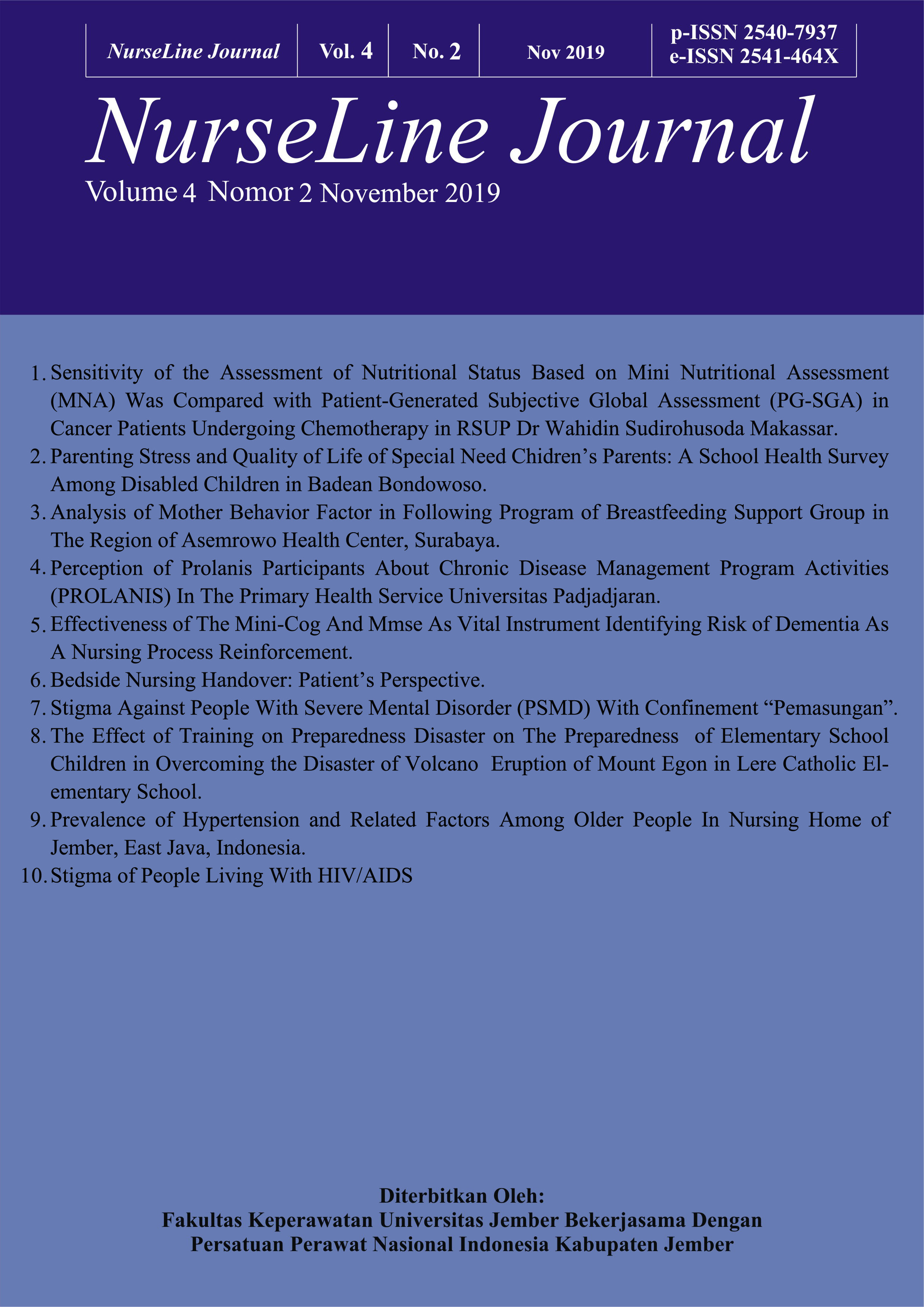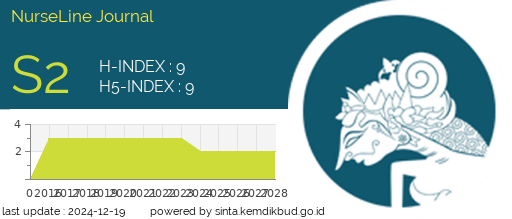The Effectiveness of The Mini-Cog and MMSE As Vital Instrument Identifying Risk of Dementia As A Nursing Process Reinforcement
DOI:
https://doi.org/10.19184/nlj.v4i2.13708Keywords:
demensia, kerusakan kognitif, MMSE, pengkajian keperawatanAbstract
ABSTRACT
West Kalimantan, majorly in density populated city-Pontianak- had not accurate statistic review about dementia and Alzheimer’s’s. Huge nursing care attention to elderly was put on physically as degenerative process, while emotional and memory either cognitive function were not clearly assessed. The purpose of this study was to compare the effectiveness of Mini-Cog and MMSE as valid instrument identifying and finding cognitive impairment in elderly which were leading to risk of dementia as part of nursing assessment.
This was a cross-sectional study with 108 literate elderly of both genders at the outpatient clinics and shelters of Geriatricts and nursing homes in city of Pontianak dan district of Kubu Raya, West Kalimantan. Sensitivity and specificity of vital measurements the Mini-Cog were compared with those of the Mini- Mental State Exam (MMSE). Some factors-age, education, ethnicity, sleep duration- were tested to find its correlation to cognitive impairment.
Results. All who met criteria for probable dementia based on informant interviews and with no revealed history of cognitive decline were included. Mini-Cog had the highest sensitivity and correctly classfied the greatest percentage (60,2 %) of subjects in state positive cognitive impairment. Moreover, MMSE had 53,7 % sensitivity to recognized “probable’ and “definite†cognitive impairment. The MMSE score was 21,88±11,309 which was in higher risk. Administration time for the Mini-Cog was 3 minutes while MMSE had 7 minutes.
Conclusions. The Mini-Cog instrument is the easier way and more effective in revealing the risk of dementia with minimal language interpretation requirement and less training to administer than MMSE. Elderly in upper 60 ages is higher risk group to undergo cognitive impairment-range from mild to moderate even severe.
KEY WORDS: dementia, cognitive impairment, nursing assessment, MMSE, clock draw test.
ABSTRAK
Kalimantan Barat, khususnya Pontianak belum memiliki data akurat tentang Demensia dan Alzheimer’s. Atensi mayor dalam proses keperawatan dan pelayanan kesehatan pada lansia rata-rata diletakkan pada aspek fisik yang terlihat, sementara aspek psikologis, emosi dan memori tidak terkaji dengan baik. Skrining status mental jarang dilakukan, tidak ada implikasi, dan tidak ada data kejadian Demensia resmi melalui Riset Kesehatan Dasar (Riskesdas). Tujuan penelitian ini adalah untuk membandingkan efektivitas Mini-Cog dan Mini Mental State Examination (MMSE) sebagai instrument valid dalam pengkajian keperawatan guna mengidentifikasi dan menemukan kerusakan kognitif lansia yang dapat mengakibatkan risiko demensia. Penelitian ini merupakan studi potong lintang dengan 108 partisipan lansia tidak buta huruf pada klinik rawat jalan dan panti lansia di Kota Pontianak dan Kabupaten Kubu Raya, Kalimantan Barat. Beberapa faktor seperti umur, pendidikan, etnis, dan durasi tidur diuji untuk menemukan korelasinya terhadap kerusakan kognitif. Parekrutan partisipan dilakukan berdasarkan wawancara kepada informan dan tidak ada riwayat didiagnosis penurunan fungsi kognitif sebelumnya.
Berdasarkan temuan didapatkan bahwa Mini-Cog dengan tepat mengklasifikan persentase terbesar kerusakan kognitif yaitu 60,2 % state positif dan sebanyak 53,7 % mengalami state gangguan kognitif baik probable maupun definite menurut skoring Mini Mental State Examination (MMSE). Rerata nilai kognitif partisipan berdasar skoring MMSE adalah 21,88±11,309 yang berarti berada pada level risiko tinggi mengalami gangguan fungsi kognitif. Instrumen Mini-Cog sama efektif mengukur kemampuan kognitif lansia dalam 3 menit sedangkan MMSE efektif dalam waktu 7 menit. Instrumen Mini-Cog merupakan instrument yang lebih mudah bagi perawat dalam membantu menemukan risiko demensia tanpa terhalang oleh substanti Bahasa maupun etnis. Lansia pada usia lebih dari 60 tahun merupakan kelompok yang lebih tinggi mengalami kerusakan kognitif ringan hingga sangat berat yang berisiko pada kejadian demensia.
KATA KUNCI: demensia, kerusakan kognitif, pengkajian keperawatan, MMSE, tes menggambar jam.
Downloads
References
Boesri, Darwain, Fionasari, Permatasari. 2013. Riset Kesehatan Dasar: Pokok-pokok Hasil Riskesdas dalam Angka Provinsi Kalimantan Barat Tahun 2013. Buku 2. Jakarta:Badan Penelitian dan Pengembangan Kesehatan Kementrian Kesehatan RI.
Borson S. The mini-cog: a cognitive “vitals signs†measure for dementia screening in multi-lingual elderly. Int J Geriatr Psychiatry 2000; 15(11):1021.
Borson S, Scanlan JM, Chen P, Ganguli M. The Mini-Cog as a screen for dementia: validation in a population-based sample. J Am Geriatr Soc. 2003;51(10):1451-1454.
National Institute for Health Research, 2016, Join Dementia Research. http://news.joindementiaresearch.nihr.ac.uk/mindset-study/
All Party Parliamentary Group on Dementia. Dementia Rarely Travels Alone: Living with Dementia and Other Conditions. London, UK: /APPG_on_Dementia_2016_Report(2).pdf; 2016. [Google Scholar]
Alzheimer’s Association. 2016 Alzheimer's disease facts and figures. Alzheimer's and Dementia. 2016;12(4):459–509. doi: 10.1016/j.jalz.2016.03.001. [PubMed]. [Chocrane Library]
Chambers, L. W., Sivananthan, S., & Brayne, C. (2017). Is Dementia Screening of Apparently Healthy Individuals Justified?. Advances in preventive medicine, 2017, 9708413. doi:10.1155/2017/9708413
Clark, Lindsay, et al. Beta-amyloid and cognitive decline in late middle age: Findings from the Wisconsin Registry for Alzheimer’s Prevention study. Alzheimer’s &Dementia, 2016,1-10. Elsevier.
Forbes D, Blake CM, Thiessen EJ, Peacock S, Hawranik P. (2014). Light therapy for improving cognition, activities of daily living, sleep, challenging behavior, and psychiatric disturbances in dementia. Cochrane Database of Systematic Reviews, Issue 2. Art. No.:CD003946. DOI: 10.1002/14651858.CD003946.pub4.
Fowler, N., Perkins, A., Gao, S., Sachs, G., Uebelhor, A., & Boustani, M. (2018). Patient characteristics associated with screening positive for Alzheimer’s disease and related dementia. Clinical Interventions in Aging, Volume 13, 1779–1785. doi:10.2147/cia.s164957
Kuller, L., Lopez, O., Becker, J., Yuefang, Newman, A. 2015. Risk of dementia and death in the long-term follow-up of the Pittsburgh Cardiovascular Health Study-Cognition Study. Alzheimer’s& Dementia. 2015, 1-14. Elsevier-Science Direct.
McCarten JR, Anderson P Kuskowski MA et al. (2012). Finding dementia in primary care: the results of a clinical demonstration project. J Am Geritr Soc.;60(2):210-217.
McCleery J, Cohen DA, Sharpley AL. Pharmacotherapies for sleep disturbances in dementia. (2016). Chocrane Database of Systematic Reviews, Issue 11. Art. No.:CD009178. DOI: 10.1002/14651858. CD009178.pub3.
Mukadam N, Cooper C, Livingston G. A systematic review of ethnicity and pathways to care in dementia. Int J Geriatr Psychiatry. 2011;26:12–20. [PubMed] [Google Scholar]
Rezende, G.P., Cecato, J.F., & Martinelli, J.E. (2013). Cognitive abilities screening instrument-short form, mini-mental state examination and functional activities questionnaire in the illiterate elderly. Dementia & neuropsychologia; 7(4);410-415. DOI:10.1590/s1980-57642013dn74000009.
Rizzi,L., Rosset,I., dan Roriz-Cruz. 2014. Global Epidemiology of Dementia: Alzheimer’s and Vascular Type. Biomed Research International;Vol 2014;Hindawi Publishing Corporation.
Rovner, B. W., Casten, R. J., & Harris, L. F. (2013). Cultural diversity and views on Alzheimer disease in older African Americans. Alzheimer disease and associated disorders, 27(2), 133–137. doi:10.1097/WAD.0b013e3182654794
Seitz DP, Chan CCH, Newton HT, Gill SS, Herrmann N, Smailagic N, Nikolaou V, Fage BA. (2018). Mini-Cog for the diagnosis of Alzheimer’s disease dementia and other dementias within a primary care setting. Chocrane Database of Systematic Review, Issue 2. Art. No.: CD011415. DOI: 10.1002/14651858.CD011415.pub2.









